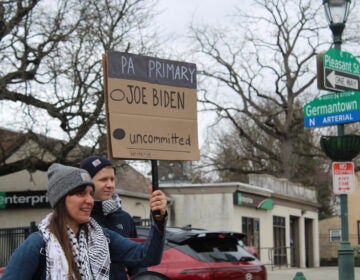Seeking stability at Germantown High
In some city schools, the Philadelphia School District’s so-called Renaissance process has been anything but smooth. In recent weeks, students at West Philadelphia, Martin Luther King and Audenried High Schools have walked out in protest of the District’s Renaissance plans.
A teacher at Audenried was reassigned to the district’s “rubber room” because of her role supporting her school’s walkout. An advocate organization has scheduled a rally at district headquarters today to call for an end to “intimidation” of teachers and students who are critical of Renaissance policies.
GHS is more comfortable with change
But if the process has roiled emotions elsewhere in the city, so far the transition has been quiet at Germantown High, and principal Margaret Mullen hopes it stays that way.
“When I came on board, the children had lost their sense of what it was to be a student,” said Mullen, who took the job at the beginning of the 2009-10 school year. “We had a lot of cleaning up to do. Are we finished? We have a long way to go.”
The Renaissance program represents the Philadelphia School District’s attempt to improve what it calls “chronically failing schools.” Schools involved get new financial and academic supports, but in some cases at least half of their teachers must leave.
At King, Audenried and West, Renaissance opponents have argued that their schools’ hard-won recent improvements will be undermined by the changes the Renaissance process requires. But in Germantown’s case, Mullen sees a chance to bring consistent leadership to a school that’s been through nine principals in ten years.
“We had to work on getting some rules in place,” she said of her first months at Germantown, a neighborhood high school of about 800 students. “We had to be consistent. It is difficult to get systems in place when you don’t have consistency of staff [and] administration. Discipline systems, attendance systems, grading systems, you name it – with all the different principals in place, everybody [had been doing] things a little differently.”
The promise
This year, Germantown High was named a “Promise Academy” – a subset of Renaissance schools which are run by the district itself, instead of a charter school or other outside provider.
Last Thursday, Mullen hosted a community meeting at Germantown to explain the changes underway. As a group of about fifty parents, alumni, students and teachers listened, district officials laid out the basics: as a Renaissance Promise Academy, Germantown will feature longer school days and Saturday classes.
And despite the district’s looming budget deficit, officials say that Renaissance schools can count on an annual injection of extra dollars for additional language classes and other academic supports (last year, six Promise Academies split $9.7 million in Renaissance funds, much of which paid for longer hours for staff).
In return, like most Promise Academies, Germantown will be required to replace at least fifty percent of its current staff. Mullen will be allowed to stay only because she’s been there less than two years; otherwise, the Renaissance policies would require that she too be replaced.
Some success, even now
In the audience was Vera Primus, president of Germantown’s alumni association. Primus praised Mullen’s leadership; since her arrival last year, attendance is up from about 70 percent to close to 80 percent, suspensions have dropped from close to 600 a year to about 350, and for the first time in eight years, the school is not on the state’s list of “persistently dangerous” schools.
And while the school’s test scores remain low – each year since 2006, only about 12 percent of Germantown’s 11th graders have ranked “advanced or proficient” on the state’s reading test, well below the district’s current average of about 40 percent – Primus says it will be a good thing if Mullen can keep Germantown on its current path.
“This school needs stability – we’ve had a hard time getting anyone to stay here,” Primus said. “[Ms. Mullen] has done a wonderful job. When you walk down the halls, the kids are in the classroom. It’s a different aura. Two years ago, you walk down the hall and you might have been a little uneasy. But it’s not like that anymore.”
Also listening was Danielle Dixon, whose son, Simone Mitchell, is a junior at Germantown who recently transferred from another school. She’d known Germantown only by its bad reputation – “violence, poor statistics, bottom of the barrel,” she said – but she’d been pleasantly surprised by her son’s experience. He’d been failing at Parkway West, playing the class clown and earning D’s and F’s, but he’d found his groove at Germantown, earning A’s and B’s and taking two honors classes, Dixon said.
“To see his progress, coming home satisfied, seeing him turned completely around – you guys are doing something right,” Dixon told Mullen. “Keep up the good work.”
Later, Mitchell agreed that Germantown had done well by him, but added that it was far from perfect. “You’ve got some teachers that really care, and you can tell because they’re always in your head about it,” Mitchell said. “And then you have some that don’t really do nothing. All my teachers, it seems like they do care – they try, but you can’t control a classroom of thirty kids. The biggest challenge for a teacher at this school is that the kids aren’t disciplined.”
Mitchell said that he succeeds by steering clear of troublemakers and sticking with a “small circle” of trusted friends. “Get to class, keep my head down,” is how he described his strategy. “Keep my head in the books.”
Mullen said that her goal is to make Germantown a place where students like Mitchell are the rule, not the exception.
What GHS can expect
Mullen was joined at the meeting by William Wade, principal of Vaux High School, which became a Renaissance Promise Academy last year. Wade promised parents that they’d see a significant improvements in climate, attendance, and academics under the Promise Academy model.
“Our data resembled that of Germantown High School,” Wade said. “We had a high dropout rate, we had an annual rate of attendance of about 71 percent, and here it is March and we’ve turned that around totally …. I’m very proud to say we have an 86 percent attendance rate right now.
Wade also said academic performance has improved significantly at Vaux, although testing has not yet been completed that will fully measure the academic progress at any of the six Promise Academies launched last year. Lois Powell Mondesire, a turnaround specialist on the district’s Promise Academy team, told the group at Germantown that predictive tests suggest “tremendous gains” for all last year’s Promise Academies.
Finding a match in new teacher outlook
Wade said that while programs and resources are important, the real key to any improvements is staff. To improve Vaux, he needed to bring in teachers who would firmly support the policies he sought to implement.
“We hit the reset button,” Wade said. “We had to make sure we identified the teachers that knew that we had a moral responsibility to correct these schools. We had to make sure we could identify the teachers that were capable, and had been doing it, or were … willing to do it.”
Mullen agreed that getting the right staff in place for next year will be her biggest challenge. All of Germantown’s current staff will be allowed to re-apply for their jobs; by April she will know how many extra spots she’ll need to fill (according to district data, last year’s Promise Academies typically brought back only about a quarter of their original staffs; many of the remaining spots were filled by first-year teachers). By June, she hopes to know who’ll be on next year’s staff.
“The hardest thing for me is going to be hiring the individuals that we’re looking for, who feel the same way we feel, who have the same pedagogical outlook about high expectations and teaching as a craft,” Mullen said.
That includes a willingness to work with the instructional model (the so-called “seven-step lesson plan”) that Mullen wants used in every classroom. It also includes an ability to accommodate the diverse needs and learning styles of urban students.
“We have a lot of different kinds of learners. Some are talky, and they’re going to get up and move – let them talk. Let them have a conversation,” she said. “Just make sure it’s educational.”
Working with young teachers
Debbie Grill, a retired teacher who served as an academic coach at Germantown from 2005-2009, said that Mullen’s biggest challenge will be maintaining stability of her programming in the face of the anticipated staff turnover. “The most challenging job was just helping new teachers,” she said of her time at Germantown. “They were so overwhelmed – it’s very hard. It takes a couple of years to learn how to function in a classroom, how to organize things. Helping them, I loved it, but it was very challenging.”
Mullen says she knows it won’t be easy. But she’s used to dealing with young teachers – this year, 25 or her 87 teachers are in their first or second year. And she’s hoping that her best teachers are willing to stay at Germantown and accept the longer hours and academic requirements that come with being a Renaissance school.
“I have a wonderful staff,” she said. “We’re going to hope and pray that a lot of them get back in.”
WHYY is your source for fact-based, in-depth journalism and information. As a nonprofit organization, we rely on financial support from readers like you. Please give today.




